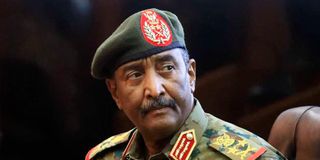Sudan conflict: Burhan renews opposition to President’s Ruto role

Sudan's top army general Abdel Fattah al-Burhan holds a press conference at the General Command of the Armed Forces in Khartoum on October 26, 2021.
What you need to know:
- Sudan has blown hot and cold over the last six months on whether it will accept IGAD to mediate.
- At least 12,000 people have been killed so far in the clashes between the two sides, and 6.6 million displaced.
Sudan Correspondent
Sudan's military government has protested to the regional bloc, the Intergovernmental Authority on Development (Igad), accusing it of inserting issues proposed by Kenyan President William Ruto outside an official meeting in a communique released on Sunday.
The bloc had met in Djibouti on Saturday to discuss the raging conflict in Sudan between the Sudan Armed Forces led by Abdel Fattah al-Burhan and the Rapid Support Forces (RSF) led by Mohamed Hamdani Daglo 'Hemedti'.
The communique, issued a day later, suggested that the warring factions had agreed to meet face-to-face for the first time since the war began in April.
The statement said Hemedti had accepted “the proposals of the Assembly for an unconditional ceasefire, resolution of the conflict through political dialogue and the holding of a one-on-one meeting with the Commander of the Sudanese Armed Forces (SAF) with the facilitation of Igad.”
But the Sudanese junta's Foreign Ministry said the statement should be corrected because it gave an "inaccurate picture".
“There were points that had been unduly inserted into the draft, besides the flawed wording of what was agreed upon regarding some important issues, to the extent that it did not accurately reflect what had been reached,” the ministry said in a statement, adding that it had also written to Igad to lodge a formal protest.
The communique said the leaders meeting in Djibouti had held a telephone conversation with Hemedti, whom they had persuaded to cease fire and agree to dialogue.
Khartoum said: “If there was such a call, it would have taken place between the Kenyan President (William Ruto) and the rebel leader after the end of the Summit and as such, it is not part of the Summit official activities to merit mentioning in the final communique.
“Moreover, Igad is an intergovernmental organisation and recognises only government representatives.
“The inaccuracy of stating that the President of the Transitional Sovereignty Council agreed to meet with the leader of the rebellion. The President has stipulated clearly that for such a meeting to take place, it must be preceded by observing a permanent ceasefire, the withdrawal of the rebel forces from the capital city and their subsequent assembly in agreed on sites outside Khartoum.”
Burhan initially accused President Ruto of siding with Hemedti because of their past friendship. The Kenyan president insists he is neutral, but his office did not immediately respond to the Sudanese statement. In fact, just two weeks before the summit, Burhan had travelled to Kenya to meet Ruto, after which they agreed to support the Jeddah process of peace talks in which Igad is involved.
Sudan also rejected as false the mention in the communiqué of the presence of Sheikh Shakboot bin Nahyan al Nayhan, Minister of State for Foreign Affairs of the United Arab Emirates. The ministry said "it did not happen".
Sudan has flip-flopped over the past six months on whether it will accept Igad mediation. It rejected an earlier summit outcome that created the Quartet of countries to mediate the conflict, which included Kenya, Ethiopia, South Sudan and Djibouti. Sudan rejected the decision as not based on consensus and accused Kenya of bias.
But Burhan, seeking to shore up his legitimacy, has recently toured these very countries to seek support.
On Sunday, Khartoum declared 15 diplomats from the United Arab Emirates (UAE) persona non grata and gave them until Tuesday to leave the country.
The decision came after the UAE's acting Charge d'Affaires in Sudan, Badriya Al-Shahi, was summoned and informed of the Sudanese government's decision, which followed Abu Dhabi's earlier move to expel three Sudanese diplomats in the UAE.
On Saturday, the UAE declared three senior Sudanese diplomats -- the defence attaché, his deputy, and the cultural attaché -- persona non grata.
In November, the deputy commander-in-chief of the Sudanese armed forces, Yasir Al-Atta, accused the UAE of supporting the Rapid Support Forces (RSF), a charge the UAE denied. On Saturday, Igad condemned what it called external interference and illegal arms supplies to both the SAF and the RSF.
But Khartoum said the condemnation should have focused only on the RSF, saying the SAF were the legitimate military arm of the government.
Clashes between the two sides have so far killed at least 12,000 people and displaced 6.6 million others inside and outside Sudan, according to the UN Office for the Coordination of Humanitarian Affairs.
Igad has been trying to consolidate the various peace offers to end the war.





